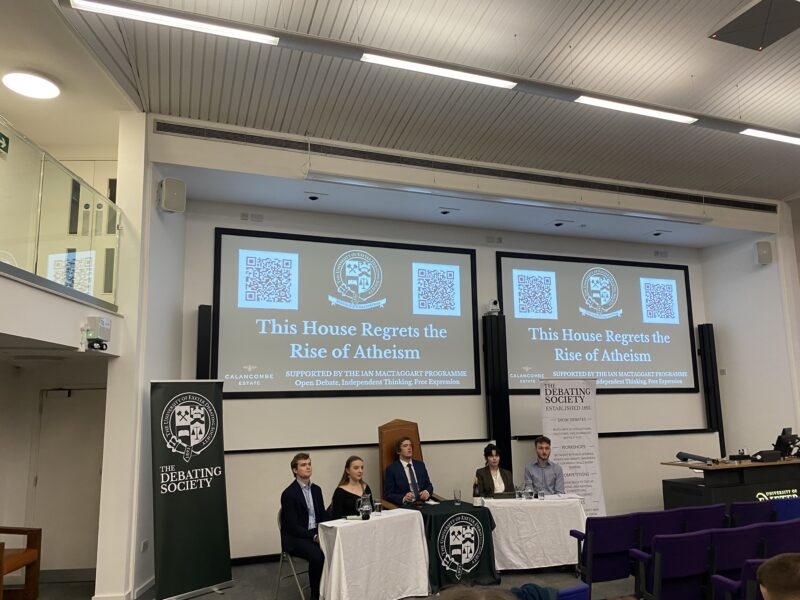
On Friday 17th January Exeposé attended the University of Exeter Debating Society’s event motioning that This house regrets the rise of atheism. The result of the debate was to deny of the motion with 56 of 71 attendees voting in favour of the opposition. In what was a heated hour and a half, both the proposition and opposition provided personal accounts of their experiences with, and without faith.
…both the proposition and opposition provided personal accounts of their experiences with, and without faith.
The proposition, Tom Philips and Amberley Thay, began their argument by suggesting that religion provides a moral framework in society and guides individuals when making decisions as to what is right and wrong, as seen in the five pillars of Islam and the ten commandments. They identified atheism as a decline in organised religion.
The commandments are “not merely guidelines but defining commandments” that provide a “deeper sense of moral accountability” and provide a “stable foundation” for civilised society. It was argued that humans alone cannot enforce this level of morality.
It was argued that humans alone cannot enforce this level of morality.
They proposed that the belief in a divine plan provides purpose and hope, where atheism does not; they suggested that atheism has created a void and has led to fragmentation, alienation and loneliness through an erasure of moral compass, and aligning with a shift in cultural and political trends.
The proposition also pointed to gangs and twisted communities that emerge supposedly as a result of the rise in atheism, leading to harmful behaviours, isolation and deprivation. They said loneliness was at an “epidemic level” and that the community in church cannot be found elsewhere.
Poppy Martin and Lucas Chapman rebutted the proposition’s argument, with the integral message that to be an atheist is to have a choice. “How can we regret a motion when it has influenced the lives of marginalised communities?” said Poppy, suggesting that atheism is not something that should be regretted, but something that makes one stronger, and closer to their own core values. ‘To be atheist is not to be amoral… to be religious is not to be a good person.”
“How can we regret a motion when it has influenced the lives of marginalised communities?”
Poppy Martin
Poppy went on to say: “I still hold values and morals but they don’t come directly from God.” It allows her to be more objective.
The opposition discussed the conflicts that arise in and between religions, such as the crusades, compared to the lack of conflict that arises from atheism, suggesting that atheism fortifies you and makes you a stronger person.
Atheism, said the opposition, also opens doors for inspiration and an objective view of the world. With considerations for the perspectives of others, Lucas shared how for him, becoming an atheist was part of becoming an adult, allowing him to open his mind and heart to the question: “what does this mean to me?”
Lucas shared how for him, becoming an atheist was part of becoming an adult…
The proposition had previously suggested that knife crime and gangs in London are a result of Atheism. Exeposé’s Callum Martin asked the proposition how they counter the history of religious violence and terrorist groups associated with religion. This question was answered by pointing to the fact that violence can come out of anything if received out of context, but that, if read correctly, the Bibile and the Quran are inherently benevolent texts.
Throughout the debate, it was notable that the opinions of both sides was bound to their integral belief systems. It became a discussion on whether there is in fact a God, rather than a debate about the realistic impacts of atheism’s rise.
Where this was to the detriment of the proposition, the opposition were able to persuade through their personal experiences, selling atheism as a process of becoming your true authentic self, something that clearly aligned with the students in the room, as seen in the majority vote for against the motion.


